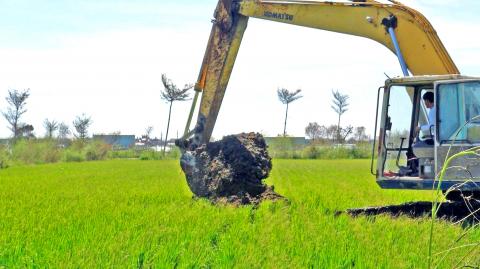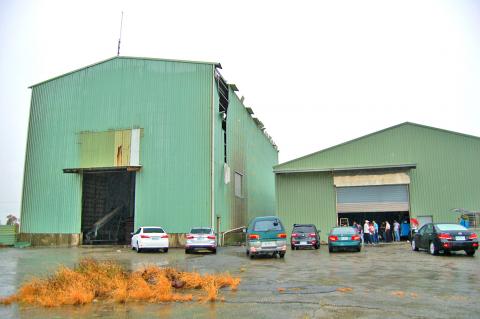A recycling company last year allegedly dumped 200,000 tonnes of furnace slag in rice paddies in Tainan before leasing the paddies to farmers, resulting in tens of thousands of kilograms of rice grown in the contaminated area reaching the market.
Five company officials now face charges, authorities said yesterday.
Tainan-based recycler Ming Hsiang Hsin Co (明祥馨環保公司) allegedly buried tonnes of furnace slag in 3.9 hectares of paddies along the Jiangjun River (將軍溪), the Bureau of Investigation’s Chiayi office said.

Photo: CNA
The company covered the dump sites with soil and then rented the paddies to local farmers, the office said.
About 70,000 jin (42 tonnes) of rice was harvested from the contaminated paddies and sold in April, the office said.
The office and Tainan’s Environmental Protection Bureau on Tuesday conducted a joint inspection and excavation of the sites and found 200,000 tonnes of slag, the office said.

Photo: Yang Chin-cheng, Taipei Times
Five Ming Hsiang Hsin officials face charges of violating the Waste Disposal Act (廢棄物清理法) and the Business Accounting Act (商業會計法) and forgery.
However, Huang Yi-jen (黃怡仁), deputy director of the Council of Agriculture’s Agriculture and Food Agency’s Southern Region Branch, quoted the owner of the affected paddies as saying that only about 45,000 jin of rice was harvested, not the 70,000 jin the bureau estimated.
Paddy owner Lin Fu-shun (林富順) also presented certified test reports for the April harvest, which showed no excessive heavy metal residue had been detected in the rice, Huang said.
Ming Hsiang Hsin began operations in 2011 and was licensed by the Tainan City Government to recycle and reprocess furnace slag into raw materials for concrete and asphalt concrete, the Tainan Environmental Protection Bureau said.
The company’s records show that it had processed 400,000 tonnes of furnace slag and earned about NT$200 million (US$6.18 million) from processing the slag since then, the Bureau of Investigation’s Chiayi office said.
The office said it was still working on tracing the whereabouts of the other 200,000 tonnes of slag.
The council said that it has declared the affected paddies to be high pollution-risk farmland, and it ordered the city government to trace and inspect crops grown on the paddies. It said the crops would be destroyed if they were found to have excessive concentrations of heavy metals.
The council said its staff, along with personnel from Tainan’s agricultural and environmental agencies, yesterday took samples of soil and crops at the dump sites and farmland within a 500m radius of the sites.
It added that the Agriculture and Food Agency had conducted 24 random inspections of Tainan farmland considered to be of high pollution risk over the past three years and no irregularities had been reported.

GAINING STEAM: The scheme initially failed to gather much attention, with only 188 cards issued in its first year, but gained popularity amid the COVID-19 pandemic Applications for the Employment Gold Card have increased in the past few years, with the card having been issued to a total of 13,191 people from 101 countries since its introduction in 2018, the National Development Council (NDC) said yesterday. Those who have received the card have included celebrities, such as former NBA star Dwight Howard and Australian-South Korean cheerleader Dahye Lee, the NDC said. The four-in-one Employment Gold Card combines a work permit, resident visa, Alien Resident Certificate (ARC) and re-entry permit. It was first introduced in February 2018 through the Act Governing Recruitment and Employment of Foreign Professionals (外國專業人才延攬及雇用法),

WARNING: From Jan. 1 last year to the end of last month, 89 Taiwanese have gone missing or been detained in China, the MAC said, urging people to carefully consider travel to China Lax enforcement had made virtually moot regulations banning civil servants from making unauthorized visits to China, the Control Yuan said yesterday. Several agencies allowed personnel to travel to China after they submitted explanations for the trip written using artificial intelligence or provided no reason at all, the Control Yuan said in a statement, following an investigation headed by Control Yuan member Lin Wen-cheng (林文程). The probe identified 318 civil servants who traveled to China without permission in the past 10 years, but the true number could be close to 1,000, the Control Yuan said. The public employees investigated were not engaged in national

The zero emissions ship Porrima P111 was launched yesterday in Kaohsiung, showcasing the nation’s advancement in green technology, city Mayor Chen Chi-mai (陳其邁) said. The nation last year acquired the Swiss-owned vessel, formerly known as Turanor PlanetSolar, in a bid to boost Taiwan’s technology sector, as well as ecotourism in Palau, Chen said at the ship’s launch ceremony at Singda Harbor. Palauan President Surangel Whipps Jr and Minister of Foreign Affairs Lin Chia-lung (林佳龍) also attended the event. The original vessel was the first solar-powered ship to circumnavigate the globe in a voyage from 2010 to 2012. Taiwan-based Porrima Inc (保利馬) installed upgrades with

ENHANCE DETERRENCE: Taiwan has to display ‘fierce resolve’ to defend itself for China to understand that the costs of war outweigh potential gains, Koo said Taiwan’s armed forces must reach a high level of combat readiness by 2027 to effectively deter a potential Chinese invasion, Minister of National Defense Wellington Koo (顧立雄) said in an interview with the Chinese-language Liberty Times (sister newspaper of the Taipei Times) published yesterday. His comments came three days after US Secretary of State Marco Rubio told the US Senate that deterring a Chinese attack on Taiwan requires making a conflict “cost more than what it’s worth.” Rubio made the remarks in response to a question about US policy on Taiwan’s defense from Republican Senator John Cornyn, who said that Chinese